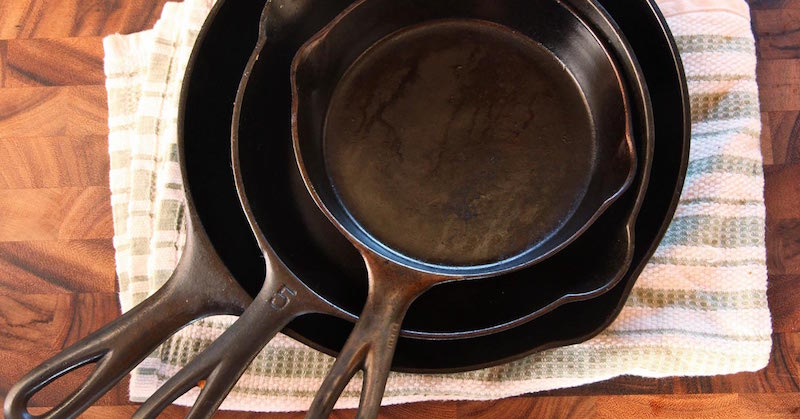IMPORTANT: Here's What You Need To Know If/When Switching To Cast Iron Pans
Last updated on
We have all heard that Teflon non-stick pans can be toxic, especially when they get scratched. If you’ve been researching for a safer and healthier option, you may have considered using cast iron pans. Here’s what you need to know if you’re planning to switch.
9 Reasons To Use Cast Iron Cookware
- Cast iron cookware is safe. Unlike most non-stick pans that release toxins into food once scratched (and they always get scratched!).
- Food comes out tastier. Not only does pre-seasoned cast iron cookware require less oil to cook with, but the food comes out flavored. You can get the best crust on your food and it simply tastes much better.
- Cast iron cookware is very durable. With proper care, cast iron cookware can last a lifetime. You can re-season and recondition it as many times as you want.
- It’s inexpensive. You can buy a new, pre-seasoned cast iron skillet for under $20.00. That’s pretty cheap for a life time investment that even your grandchildren will be able to use.
- Easy to clean. Unlike other cookware, you don’t need to use soap when washing cast iron. In fact, it is advisable not to use soap as it may strip the seasoning off of the pan. All you need is a non-abrasive sponge and hot water.
- It’s been used for thousands of years. Cast iron was first made during the 6th century B.C. in China and later being heavily produced in Europe during the 14th century. Cast iron became popular in America during the 18th and 19th centuries due to it’s low price and durability.
- It’s non-stick. A properly seasoned cast iron skillet is naturally non-stick. This is because the oils from previous cooking have been built up which makes a natural non-stick coating on the pans.
- Heating benefits. Cast iron cookware distributes heat very evenly. Most other non stick pans can not be used on high heat as their thin metal is not able to distribute heat quickly.
- Can be used on your stove top, oven, or charcoal grill. Cast iron cookware can be used inside the oven and even on top of a charcoal grill as it can withstand various heating levels without causing damage to the shape of the cookware.
If you wish to use cast iron cookware, here are some helpful tips.
Cautionary Note:
Although there are many studies showing that cast iron cookware is a safer and healthier alternative to use compared to Teflon non-stick cookwares, there are some points to keep in mind when using cast iron cookwares.
Cast iron cookwares may leach some iron into your food. This may be acceptable for women who are still menstruating as they are losing blood every month—the additional iron may be helpful. It may also be beneficial for growing children and young adults who can do with the extra iron supply. A point to note though, cast iron cookware is NOT a solution for an anemic condition.
However, and this is important to know. When cooking for the entire family using an iron cast cookware, there may be excess iron for certain other members of the family. For example, women who have menopaused and adult men who don’t need the extra iron.
In these cases, cast iron may pose as a problem as it is unlike iron that you obtain naturally from food. Excess iron in the blood may cause an iron overload, in the case of individuals who don’t need that extra iron—that is menopausal women and adult men.
In case of an iron overload, it may cause a condition known as hemochromatosis. Some of the symptoms of iron overload are: Fatigue, joints/muscles weakness, unexplainable weight loss, shortness of breath, elevated liver enzymes, brain fog, excessive hair loss.
One way to reduce the symptoms of iron overload is by regularly donating blood. Not only will you save lives by donating your blood, you also encourage your body to synthesize new blood cells. And, avoid using cast iron cookwares.
Sources:
https://www.drweil.com/drw/u/id/QAA364217
https://healthycanadians.gc.ca/product-safety-securite-produits/consumer-consommation/education/household-menagers/cook-cuisinier-eng.php
https://www.thekitchn.com/how-to-clean-a-cast-iron-skillet-cleaning-lessons-from-the-kitchn-107747
https://www.britannica.com/technology/cast-iron
Some of the links I post on this site are affiliate links. If you go through them to make a purchase, I will earn a small commission (at no additional cost to you). However, note that I’m recommending these products because of their quality and that I have good experience using them, not because of the commission to be made.


































 JOIN OVER
JOIN OVER
Comments